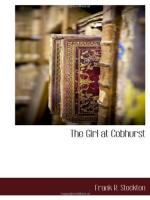“Some things concern all of us,” retorted Miss Panney. “Suppose Bishop White, when he was ordained and came back to this country, had found a little village—”
Her remarks were stopped by a dish of salad. The young and tender leaves of lettuce were half concealed by a mayonnaise dressing.
“This makes three dollars,” thought Miss Panney, as she helped herself, “for Kipper never makes any difference, even if you send your own lettuce to be dressed.” And then she went on talking about Bishop White, and what he would have thought of a little cathedral in every country town.
“But the Methodists do not have cathedrals,” said Mrs. Tolbridge.
“Which makes it all the worse when they try to build their meeting-houses to look like them,” replied the old lady.
It was a long time since Miss Panney had tasted any mayonnaise dressing as good as this. But she remembered that the strawberries were to come, and did not help herself again to salad.
“If one of the old Methodist circuit-riders,” she said, “after toiling over miles of weary road in the rain or scorching sun, and preaching sometimes in a log meeting-house, sometimes in a barn, and often in a private house, should suddenly come upon—”
The imaginary progress of the circuit-rider was brought to a stop by the arrival of the last course of the luncheon. From a pretty glass dish uprose a wondrous structure. Within an encircling wall of delicate, candied tracery was heaped a little mound of creamy frost, the sides of great strawberries showing here and there among the veins and specks of crimson juice.
Miss Panney raised her eyes from this creation to the face of her hostess.
“Kitty,” said she, “is this the doctor’s birthday?”
“No,” answered Mrs. Tolbridge, with a smile; “he was born in January.”
“Yours then, perhaps?”
Mrs. Tolbridge shook her head.
“A dollar and a half,” thought the old lady, “and perhaps more. Five dollars at the very least for the meal. If the doctor makes that much between meals, day in and day out, she ought to be thankful.”
The dainty concoction to which the blazing-eyed old lady now applied herself was something she had never before tasted, and she became of the opinion that Kipper would not get up a dish of that sort, and so much of it, for less than two dollars.
“There was a Methodist preacher,” she said, spoonful after spoonful of the cold and fruity concoction melting in her mouth as she spoke, “a regular apostle of the poor, named Lorenzo Dow. How I would like to have him here. He was a man who would let people know in trumpet tones, by day and by night, what he thought of wicked, wasteful prodigality, no matter how pleasant it might be, how easy it might be, or how proper in people who could afford it. Is there to be anything more, Kitty Tolbridge?”
The doctor’s wife could not restrain a little laugh.




